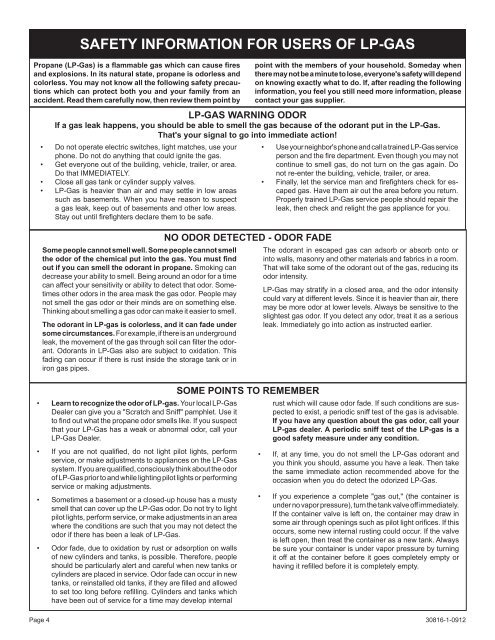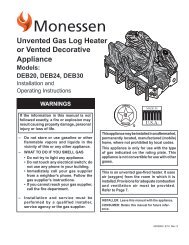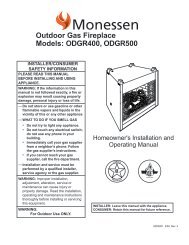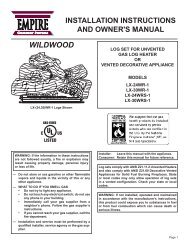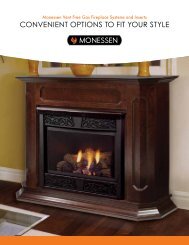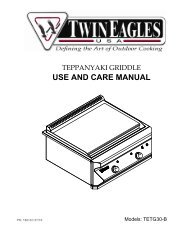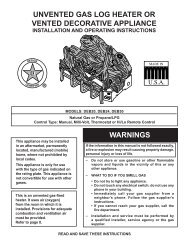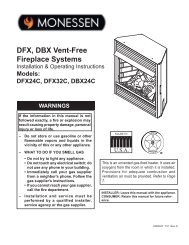Create successful ePaper yourself
Turn your PDF publications into a flip-book with our unique Google optimized e-Paper software.
SAFETY INFORMATION FOR USERS OF LP-GASPropane (LP-Gas) is a flammable gas which can cause firesand explosions. In its natural state, propane is odorless andcolorless. You may not know all the following safety precautionswhich can protect both you and your family from anaccident. Read them carefully now, then review them point by• Learn to recognize the odor of LP-gas. Your local LP-GasDealer can give you a "Scratch and Sniff" pamphlet. Use itto find out what the propane odor smells like. If you suspectthat your LP-Gas has a weak or abnormal odor, call yourLP-Gas Dealer.• If you are not qualified, do not light pilot lights, performservice, or make adjustments to appliances on the LP-Gassystem. If you are qualified, consciously think about the odorof LP-Gas prior to and while lighting pilot lights or performingservice or making adjustments.• Sometimes a basement or a closed-up house has a mustysmell that can cover up the LP-Gas odor. Do not try to lightpilot lights, perform service, or make adjustments in an areawhere the conditions are such that you may not detect theodor if there has been a leak of LP-Gas.• Odor fade, due to oxidation by rust or adsorption on wallsof new cylinders and tanks, is possible. Therefore, peopleshould be particularly alert and careful when new tanks orcylinders are placed in service. Odor fade can occur in newtanks, or reinstalled old tanks, if they are filled and allowedto set too long before refilling. Cylinders and tanks whichhave been out of service for a time may develop internalsome points to rememberpoint with the members of your household. Someday whenthere may not be a minute to lose, everyone's safety will dependon knowing exactly what to do. If, after reading the followinginformation, you feel you still need more information, pleasecontact your gas supplier.LP-GAS WARNING ODORIf a gas leak happens, you should be able to smell the gas because of the odorant put in the LP-Gas.That's your signal to go into immediate action!• Do not operate electric switches, light matches, use yourphone. Do not do anything that could ignite the gas.• Get everyone out of the building, vehicle, trailer, or area.Do that IMMEDIATELY.• Close all gas tank or cylinder supply valves.• LP-Gas is heavier than air and may settle in low areassuch as basements. When you have reason to suspecta gas leak, keep out of basements and other low areas.Stay out until firefighters declare them to be safe.Some people cannot smell well. Some people cannot smellthe odor of the chemical put into the gas. You must findout if you can smell the odorant in propane. Smoking candecrease your ability to smell. Being around an odor for a timecan affect your sensitivity or ability to detect that odor. Sometimesother odors in the area mask the gas odor. People maynot smell the gas odor or their minds are on something else.Thinking about smelling a gas odor can make it easier to smell.The odorant in LP-gas is colorless, and it can fade undersome circumstances. For example, if there is an undergroundleak, the movement of the gas through soil can filter the odorant.Odorants in LP-Gas also are subject to oxidation. Thisfading can occur if there is rust inside the storage tank or iniron gas pipes.no odor detected - odor fade• Use your neighbor's phone and call a trained LP-Gas serviceperson and the fire department. Even though you may notcontinue to smell gas, do not turn on the gas again. Donot re-enter the building, vehicle, trailer, or area.• Finally, let the service man and firefighters check for escapedgas. Have them air out the area before you return.Properly trained LP-Gas service people should repair theleak, then check and relight the gas appliance for you.The odorant in escaped gas can adsorb or absorb onto orinto walls, masonry and other materials and fabrics in a room.That will take some of the odorant out of the gas, reducing itsodor intensity.LP-Gas may stratify in a closed area, and the odor intensitycould vary at different levels. Since it is heavier than air, theremay be more odor at lower levels. Always be sensitive to theslightest gas odor. If you detect any odor, treat it as a seriousleak. Immediately go into action as instructed earlier.rust which will cause odor fade. If such conditions are suspectedto exist, a periodic sniff test of the gas is advisable.If you have any question about the gas odor, call yourlp-gas dealer. A periodic sniff test of the lp-gas is agood safety measure under any condition.• If, at any time, you do not smell the LP-Gas odorant andyou think you should, assume you have a leak. Then takethe same immediate action recommended above for theoccasion when you do detect the odorized LP-Gas.• If you experience a complete "gas out," (the container isunder no vapor pressure), turn the tank valve off immediately.If the container valve is left on, the container may draw insome air through openings such as pilot light orifices. If thisoccurs, some new internal rusting could occur. If the valveis left open, then treat the container as a new tank. Alwaysbe sure your container is under vapor pressure by turningit off at the container before it goes completely empty orhaving it refilled before it is completely empty.Page 430816-1-0912


